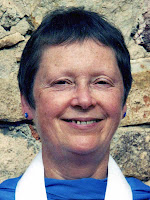
Shakyajata is a woman Order Member from Manchester, turned India traveller and supporter of the many graduates of TBMSG’s Dhamma and Social training programme at Nagaloka in central India. Since the programme started 8 years ago some 400 young men and women from all over India have graduated; many have returned home to begin Dhamma groups where they live. She and Priyadaka, also from the UK, are currently on an extended tour visiting many of them in their home towns and villages. She’s fundraising as she goes, and FWBO News readers are warmly invited to contribute to her fundraising page
www.justgiving.com/youngindianfutures.
She writes -
Dear all,
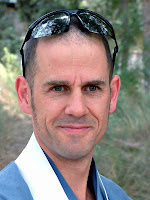
Here is an update of what I shall be doing in India this winter, all being well. The best news of the lot, is that I shall be travelling most of the time with Priyadaka, an old friend, India returnee, energetic idealist and very experienced fundraiser, to name but a few of his qualities....how auspicious is that?
Our plan, in roughly chronological order, is:
Nagpur, central India: Aryaloka Animation students, 2nd - 7th November
We hope to be able to assess the success of this experiment in giving this training to 10 ex-Nagaloka Training Institute trainees, 6 of whom are fully supported by our fundraising efforts.
Orissa, north-eastern India - Dhamma Work, 8th - 22nd Nov.
We shall be travelling round this state where there is a lot of poverty and very little in the way of specifically Buddhist activity; the ex-NTI trainees here are focusing on social work, and we hope to devise strategies to support them in future. and raise their profile. Jnanajyoti and Tejadhamma will be with us, plus Utpal, Trinath and Nagavajra and others, who are doing the work on the ground.
Hyderabad, south India - 23rd - 28th Nov.
We hope to be able to meet up with Padmavir, late of NTI. Also I hope to pick up on some of the women who were contacted on previous outreach projects to Hyderabad. And do a bit of chilling-out in fascinating places!
Thiruvanathapuram and Kollam, Kerala, south India - 30th Nov - 11th Dec.
A short, but rather full programme of activities in Trivandrum with Nagaratna and others, joined by Ratnasiddhi for some of the time. We hope to spend time at Abhayaloka in Kollam, with Binoj Babu and others, and give everyone help where we can, with fundraising and publicity, for example.
Nagaloka, Nagpur, 14th Dec. - 13th Jan.
This part of the programme is still under negotiation, but will definitely include the 'launch' of the Buddhist Comic produced by the Animation course students, which we hope will be a successful fundraiser and focus for their first self-supporting efforts. We hope to do some teaching, myself on the mainstream curriculum at Nagaloka, and Priyadaka probably teaching English at Aryaloka Computer Education (where the A.C. course is being taught.)
Wardha, 14th - 21st Jan
We will both be on the team of a BIG retreat, maybe 1000 people, for 'Dalit' (marginalised) people, led by Saddharaja. Two-thirds of the retreatants are expected to be women. Check their fundraising page at
www.justgiving.com/kshitigarbha
Our aims
This rather diffuse-looking programme will be unified, we hope, by the following long-term aims; "to support young people from disadvantaged ('low-caste') communities throughout India, so that they will have the skills and confidence to bring about radical positive change for their communities: overcoming poverty, prejudice and ignorance by peaceful means."
Your support will be most welcome, financial but also encouragement, thank you. Our fundraising page is at
www.justgiving.com/youngindianfutures.
Just to bring you up to date - I’m writing this from extremely hot and steamy Orissa. It actually rains from time to time, then it gets hotter and steamier - but I'm not complaining, Orissa is very beautiful, and we are doing things I love, with lovely people.
For example, this afternoon we visited the State Museum, Bhubaneswar, mainly to view local Buddhist artefacts; and maybe predictably, that section of the museum was closed for renovation. And in that Indian way, they let us look at the stuff anyway. There were some amazing images, - including a terrifying Tantric one of a kind of gruesome animated corpse holding a severed head - but many of them appeared to have been quite brutally defaced by some past holocaust. Orissa is strongly orthodox Hindu, and our friends here work against a lot of resistance to their Buddhist values. They are mostly young and inexperienced, and we are here to find out what sort of support network can be given to them.
In the museum, I wandered into the 'tribal section' with Trinath, who is our main organiser here, and it was absolutely delightful. He comes from a village family in Western Orissa, and was brought up in quite a traditional way; and many of the objects on display, were just like things used by his family. His grandfather made this sort of basket net to catch fish, he used to wear this sort of hat woven of leaves; and best of all, he is very interested in music, and a very good mimic, and he imitated the sounds of all the strange instruments we saw, and even knew how to make them; like a personal audio show, and it was so good to see how he came alive, in contact with his own history. I felt so privileged to share that.
Spending time with these young people who are so dedicated and kind, despite their struggles, is a sheer delight; and my Order member friends too. Tejadhamma (from Nagpur) is full of energy and enthusiasm, seems to be able to handle any situation, and is full of good ideas to support the mitras in future. Jnanjyoti (also from Nagpur) is a rock, a terrifically strong woman and a great role model for the girls and women we are meeting here. I shall miss them so much when we part (quite shortly), and I am so grateful that Priyadaka (from east London) will still be with me. He is so supportive and thoughtful, and gaining in confidence (eg in public speaking) all the time, and forming good friendships with the young guys here; they tease each other unmercifully, a very good sign.
There is so much I could write about, but this may have to do for now....we are all pretty well, I am fine, and just very happy to be here. At the weekend we will have a two-day retreat for the mitras, to try and give them some tools for their work here. Then we are off to Hyderabad, next Monday; more from there later.
best wishes to all,
Shakyajata and Priyadaka
PS - do check our fundraising page
www.justgiving.com/youngindianfutures!Labels: Dharmaduta, India, Nagpur, women















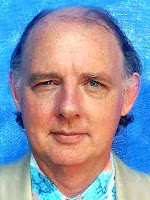


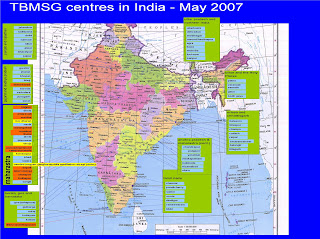
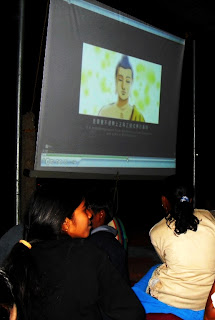
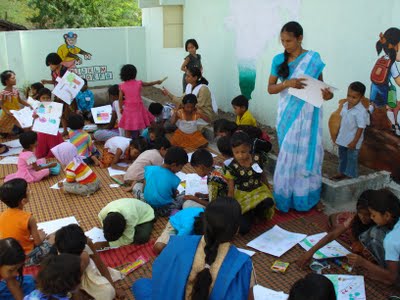



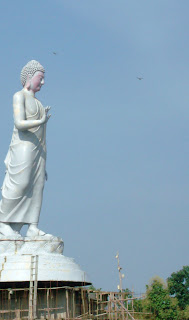




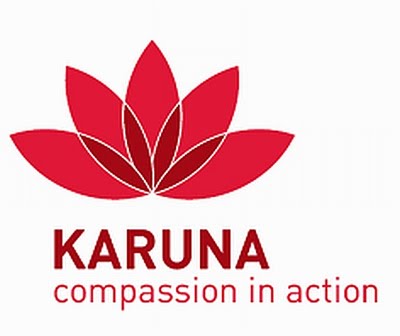
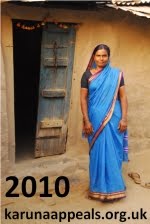
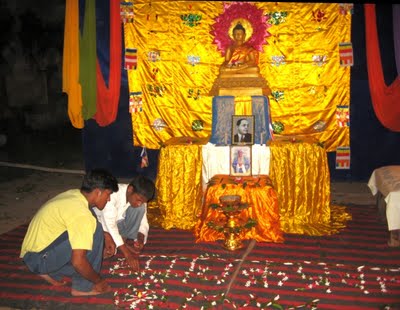
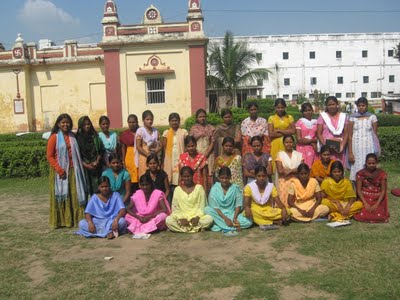
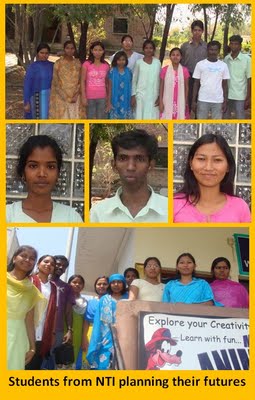
 rss
rss